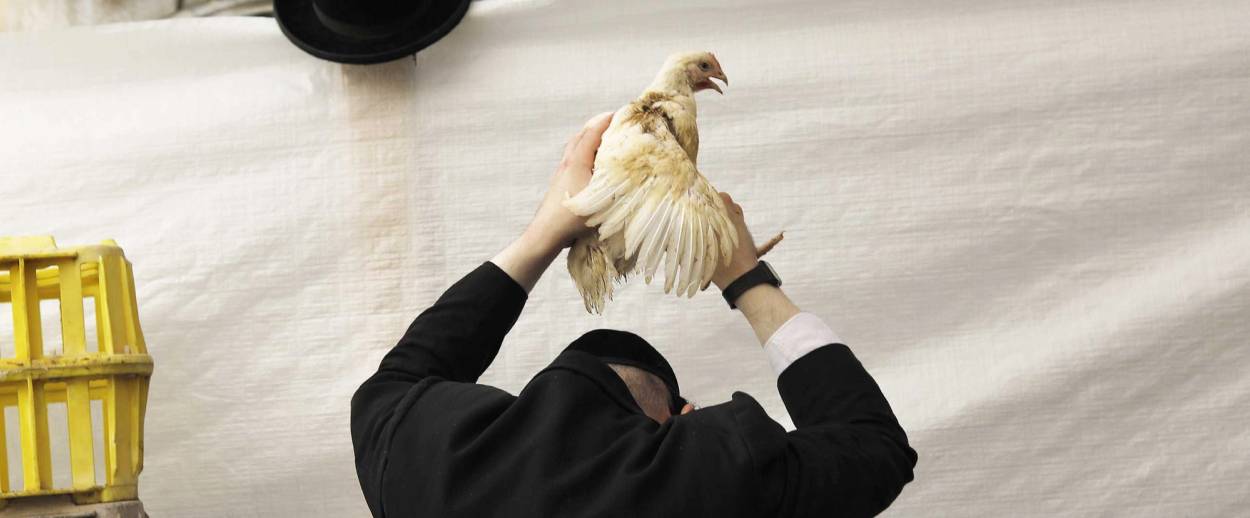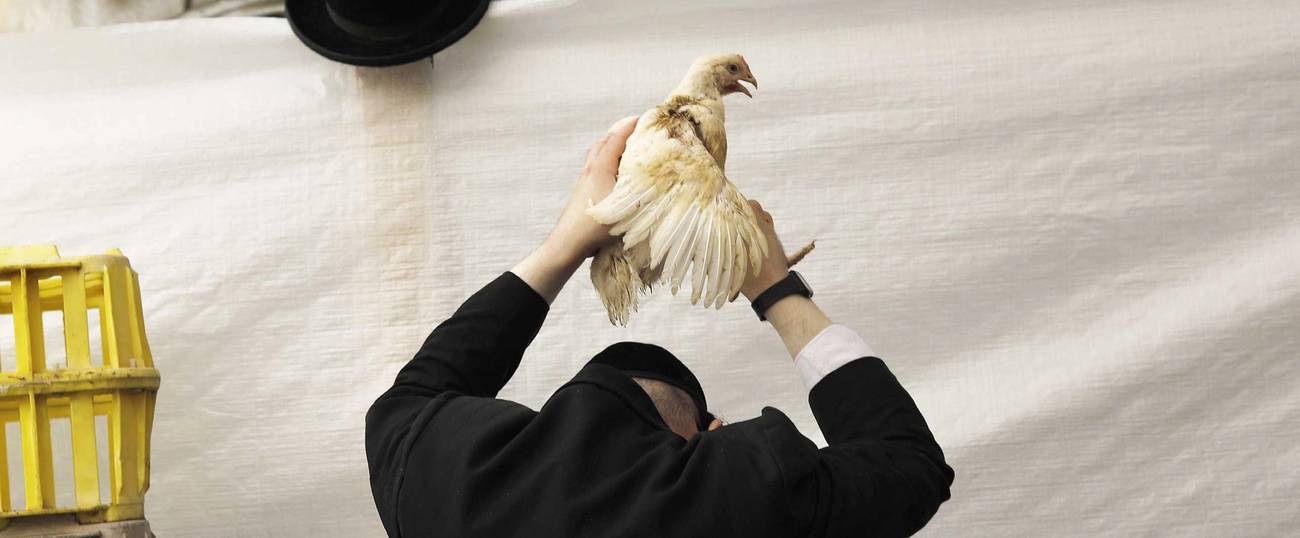My Grandfather’s Yom Kippur Ritual—and Mine
Every year I perform kapores with money, just as he did in his later years. But once, just once, I tried it with a live chicken.




Every year on the eve of Yom Kippur, I shlog kapores the way I learned to from my grandfather, though I never saw him perform the ritual with my own eyes.
Family lore tells that long before I was born, he undertook this pre-Yom Kippur activity the old-school way: symbolically transferring his sins to a live chicken, which he would wave over his head three times. Yet at some point, he began to consign his transgressions to money, to the bills and coins he gathered in his hand instead.
We never spent Yom Kippur with my grandparents, so I did not witness the scene myself. But my grandmother assured me that my grandfather recited the kapores blessings in the same endearing yet unintelligible mumble he used to lead the Pesach seder. He would then check that the coast was clear before tossing the money out the bedroom window, letting it freefall to the courtyard below. When I spoke with him after the holiday, he’d report that the money was gone by the time they left for Kol Nidre, his sins secured in someone else’s pocket.
My grandfather died just days before Rosh Hashanah the year I graduated from college. It broke me inside—not just that he was gone, but that he was denied a final opportunity to shlog kapores before his passing so close to Yom Kippur. Yet his strength and memory had departed long before, and it had already been years since he last performed the ritual.
I can still feel the rawness of his absence—even now, decades later—during the High Holidays. I stumble upon reminders of him as I prepare for Rosh Hashanah and Yom Kippur, walking through the series of private rituals I’ve established to keep him here in my world. I turn on his transistor radio, listening for his voice in the static. I run my fingertips along his Hebrew name, embroidered into the worn brown velvet of his tefillin bag.
We also drive over to the cemetery. The visit begins traditionally—with the solemn setting of stones on my grandparents’ matzeivos, their gravestones, and the recitation of a chapter of Tehillim, the Psalms. We ask them to buttonhole God, to plead that He inscribe us in the Book of Life for the coming year. The visit always ends unconventionally—with a joke I’ve chosen to share with my grandfather, a former vaudevillian with an off-color sense of humor. I caution my grandmother, who was more refined, to cover her ears.
There are other moments, too, when I know my grandfather hears me, when I feel him take my hand in his, like he did when I was a little girl. Still, I sense his presence most on the eve of Yom Kippur when I begin to make bargains with God. After I’ve put up the potatoes and the brisket for our pre-fast meal, I perform the kapores ritual as my grandfather did for much of his life. I recite the blessing, swinging dollar bills over my head in search of absolution, though I tuck the money that pulses with my sins into a pushke, a box I will later donate to charity, rather than throwing it out the window to get lost in the suburban hedges below.
It is meaningful, hopeful even, to shlog kapores and feel the physicality of it as I move into a zone of repentance. Still, each time I’d recite the blessings, the machzor would make me wonder if the way I was doing it—the way my grandfather did it—fell short. The prayer offers a direct exchange: A chicken is sent to its death for our sins. The monetary option, while there on the page, only appears in parentheses, sowing a seed of insecurity. And yet despite my perseverating, I’d land in the same place year after year. A chicken may offer the appeal of Old World authenticity, but I was good with the alternative. After all, for me, the Bronx was my grandparents’ shtetl, the one I recall with the greatest nostalgia.
It took me by surprise, therefore, when an advertisement for a local kapores event—Chickens! Atonement!—caught my eye a few years ago. Though it wasn’t our custom, I suddenly found myself tempted to swing a live animal over my head. I thought the new experience might change my luck, which had been rocky as we headed into the new year. I reserved two chickens, a male for my husband and a female for me, and made a credit-card donation online.
The parking lot was packed that Sunday, filled with other Jews feeling vulnerable in the shadow of the holiday’s approach. Looking for paths to atonement, we’d all come to lay our sins at the feet of the chickens huddled in cartons at the back of a pickup truck. The birds seemed to chatter nervously among themselves. Or perhaps, they, too, were praying to God, performing a kind of kapores of their own in a futile attempt to avert their fate at the hands of the shochet.
Overcome by the aroma, the cacophonous squawking, and my fear of their prolific scatological output, I wanted to bolt. But the rabbi and his wife, friends of ours, eased the chicken with my name on it into my waiting palms, as much as one can ease a live chicken into anything.
“Don’t let go,” they cautioned me. The truth is that I briefly considered grabbing the bird and fleeing, an attempt to save the both of us.
What kept me grounded was an intuitive sense that my grandfather was there with me, watching my every move and getting a huge kick out of the whole scene, as if he were reminiscing about the times he would shlog kapores in this way. Meanwhile, my chicken screeched as I swung her around my head three times—an omen, I convinced myself, a sign that she’d forgiven me for foisting this chaos upon her. Still, it was with enormous relief that I handed her back to the rabbi, certain that my kapores with a chicken was a one-time affair.
As the High Holidays arrive, so do the same questions I long to ask my grandfather every year around his yahrzeit. About his childhood and his parents. About the years he operated an elevator at Saks. About what made him fall in love with my grandmother. I’d also like to find out what he felt he had to atone for on the cusp of Yom Kippur and whether he continues to appeal on my behalf in the World to Come.
Of course, I’ll likely never know any of the answers, nor why he switched from a chicken to money when it came to this ritual. But I can perform the cash-only kapores I inherited from him and think about how blessed I am to have his memory lodged so deeply, lovingly, in my heart. All that’s left to do, then, is to atone and pray and shlog some gelt over my head, just as my grandfather did until the day he no longer could.
Merri Ukraincik is a blogger and essayist who is at work on a memoir. Follow her at merriukraincik.com.